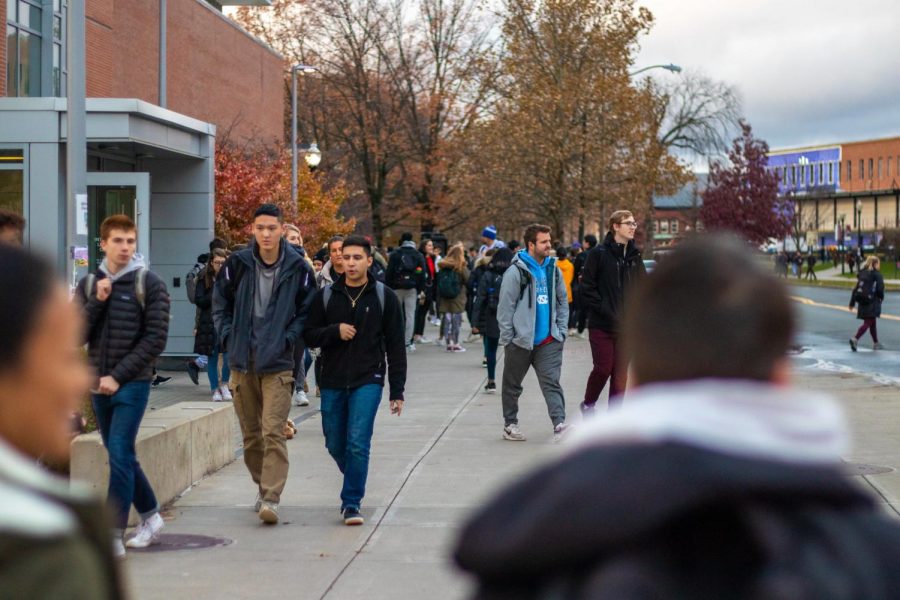After the University of Massachusetts announced that it would be reversing its decision to allow all students to live on-campus on Aug. 6, just eight days before students were supposed to begin moving in, many students realized that they may be out of a job for the semester. Some former on-campus employees have been put in a difficult financial situation as a result.
Helen Sajo, a junior economics and geography major, said she was never officially informed that she would be losing her job working for UMass Dining.
“I actually was never ‘told’ if I was going to be rehired by UMass Dining,” said Sajo. “I reached out to my manager personally over the summer, and at the time they didn’t have an answer either. Nobody ever got back to me. No emails from UMass Dining or anything. I found out the cafe I worked at would be closed for the semester via the FAQ page which said only Blue Wall and limited dining halls would be open.”
Maddie Lapierre, a sophomore psychology and early childhood education major who used to work for housing operations, said she felt that it was short notice, but she understands the University’s decision. “I did feel it was very last minute to know we couldn’t work, but it made sense due to dorms also being closed for many of us.”
Erin Crowell, a senior communications major, felt that the University did not communicate with her about not being able to return to her on-campus job as an RA.
“They informed us [about losing our jobs] Aug. 7, which was three days before move-in,” said Crowell. “For me, my sublet had ended Aug. 1 and I was temporarily staying in a friend’s apartment until they moved in, so the news meant I would be house-less shortly.”
Crowell went on to say that she struggled to make other plans after finding out that she would be unable to be an RA: “There was almost no time to make arrangements, with plans changing daily. The next week they informed us that we could apply to live on campus; at this point, I had been without housing for almost two weeks.”
Unlike Crowell’s position, not every on-campus position was completely eliminated. Some students were able to continue working remotely, such as Lily Crandall-Oral, who works teaching classes for the Recreation Center. She is now teaching classes remotely, and she has experienced some difficulties throughout the process.
“Online teaching is an adjustment for all of us,” said Crandall-Oral. “I’ve been teaching virtually throughout the summer, but the learning curve was tremendous.”
One of the issues that Crandall-Oral has experienced is a drop in attendance to her virtual fitness classes. “I love reconnecting with the UMass student wellness community, but class sizes have dropped from often over 40 people to five or fewer,” she said. “It’s harder to hold space when we ourselves are physically separated, but I know the support we provide is needed now more than ever.”
Crandall-Oral also expressed that she doesn’t feel that she is being compensated fairly for her time. “We are being paid the same amount but for less time. We’re usually paid for time before and after class, we were not told [that we wouldn’t be getting this pay],” said Crandall-Oral. “The schedule has also been cut, and each of us now teach once, tops twice, and some have decided not to teach at all.”
“We’re also asked to pre-record classes for the schedule. I know from experience it can take up to four times the amount of time to record an hour class,” said Crandall-Oral. “We also don’t have staff meetings anymore.”
Crandall-Oral feels that UMass should be paying its online workers more fairly given that they are still being charged full tuition. “It’s frustrating that UMass uses amenities like ‘virtual Campus Rec’ to rationalize charging full tuition, when it won’t even pay its student workers more than $17.50 to teach a full yoga class.”
Crandall-Oral is not the only one making less than she expected this semester. Sajo’s decision not to return to the Amherst area was partly based on her job loss. “I would’ve happily worked at UMass Dining this semester so yes, my income is less than I originally thought it would be this semester,” she said. “I ended up deciding to stay at home to save money and not having that job was a factor in that decision.”
Crowell also had increased financial burdens as a result of losing her on-campus employment. “I luckily had another job in the area, as I had been subletting since March,” she said. “However, since classes were starting soon, I had cut my hours anticipating my other paychecks beginning soon, and now have considerably more things to worry about, including having to furnish an apartment and buy food, whereas before I was on a meal plan as an RA.”
The University does not yet have accurate data to represent how many on-campus jobs have been lost this semester, according to Ed Blaguszewski, the executive director of strategic communications and special assistant to the vice chancellor for university relations. More data may be available later in the semester.
Sophia Gardner can be reached at [email protected]. Follow her on Twitter @sophieegardnerr.




















